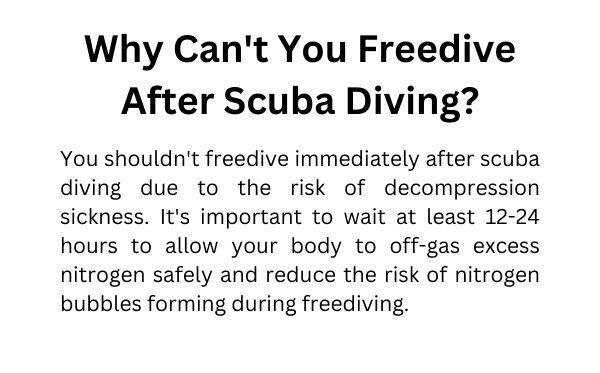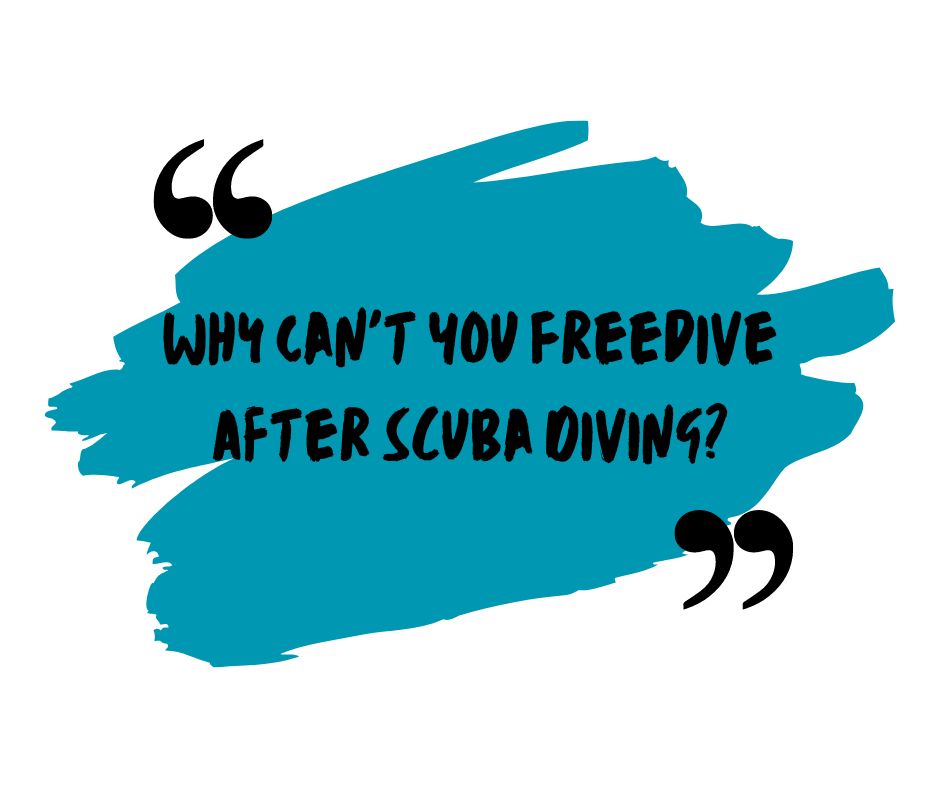People can experience the depths of the ocean by scuba diving or freediving, two exciting forms of water sports. The goal of all of these activities is to explore the underground world, but there are safety rules and physical factors that need to be thought about. A common question among people who like the water is “Why can’t you freedive after scuba diving?” This piece will talk about the reasons for this restriction and the risks that might come with it.
Understanding Scuba Diving and Freediving
Scuba Diving
Scuba diving is a way to explore underwater areas with a self-contained underwater breathing apparatus (scuba). Divers use a regulator to take in compressed air or a mixture of gases. This lets them go to great depths while keeping their breathing rate steady and comfortable. Freedivers can only go for short trips underwater, but scuba dives can go deeper and see more sea life.
Freediving
On the other hand, freediving is a water sport in which people dive without using a mask or snorkel. Freedivers use holding their breath to explore the world under the sea. Freediving is a sport that focuses on depth and length of dives, which tests the body’s ability to deal with high pressure without using compressed air.
The Prohibition of Freediving After Scuba Diving
Pressure-Related Risks
The main reason you shouldn’t go freediving right after scuba diving is that you could have problems with the pressure. As you go deeper into the water while scuba diving, the pressure builds up around you. The pressure of the air in the tank is the same as the pressure of the water where you are.
Nitrogen Absorption
One of the gases in the air divers breathe is nitrogen. Under high pressure, such as the depths reached in scuba diving, nitrogen dissolves into the bloodstream. This is not an issue when diving with proper time intervals and decompression stops, allowing the body to eliminate nitrogen safely. However, if you switch to freediving right after scuba diving, the pressure change can lead to the rapid release of nitrogen in your body.
Decompression Sickness
Rapid release of nitrogen can lead to decompression sickness, which is also called “the bends.” Nitrogen bubbles form in the bloodstream when pressure drops quickly, causing this condition. Some of the signs of decompression sickness are rashes and pain in the joints, while others are more serious brain and respiratory problems. Without treatment right away, it could be fatal.
Safety Precautions
To prevent pressure-related complications and ensure safety, it is advisable to follow established guidelines:
- Wait for Desaturation: After scuba diving, it is recommended to wait at least 12 to 24 hours before engaging in freediving. This waiting period allows the excess nitrogen in your body to off-gas safely.
- Stay Hydrated: Maintaining proper hydration is essential to help your body eliminate nitrogen more effectively.
- Consult a Diving Professional: If you are unsure about the timing between scuba and freediving, consult with a diving professional or instructor to ensure your safety.

FAQ
Can you freedive after snorkeling?
Yes, most of the time you can free dive after swimming. When you snorkel, you explore the water’s top, and your body is not under as much pressure as when you scuba dive. Still, it’s important to follow safe diving practices and pay attention to how your body reacts.
How long should you wait before freediving after scuba diving?
It is recommended to wait at least 12 to 24 hours after scuba diving before engaging in freediving. This waiting period allows excess nitrogen to off-gas from your body, reducing the risk of decompression sickness.
Are there any exceptions to the rule?
In some cases, individuals who have engaged in relatively shallow scuba dives may be able to freedive sooner. However, it’s crucial to consult with a diving professional or physician to determine the appropriate waiting period based on your specific dive profile.
In conclusion, the prohibition of freediving immediately after scuba diving is rooted in the potential risks associated with pressure-related complications, such as decompression sickness. Understanding these risks and adhering to recommended waiting periods is essential for the safety of divers. By taking the necessary precautions, you can continue to enjoy both scuba diving and freediving as separate, exhilarating water activities.
